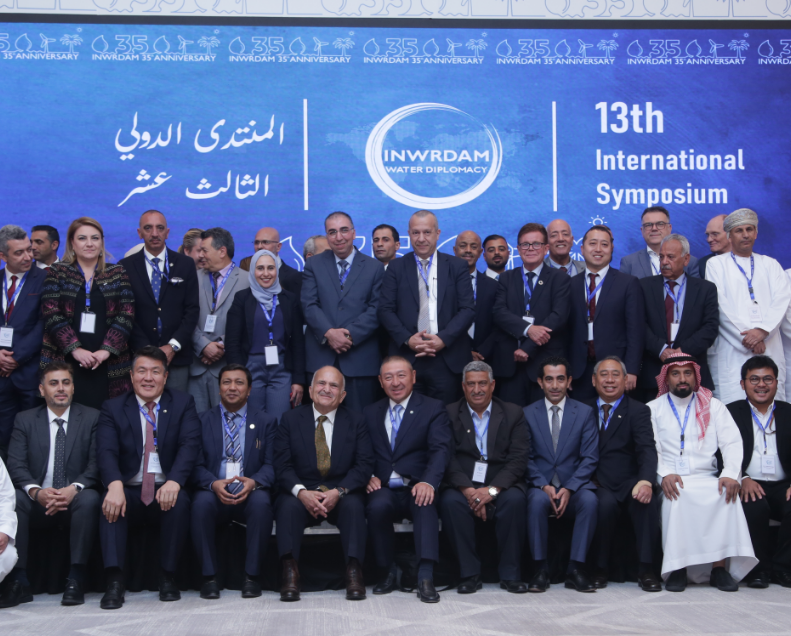31 August 2024
The WEFE Community of Practice
The Water-Energy-Food-Ecosystems (WEFE) Nexus is a concept that recognizes the interconnections between water, energy, food, and ecosystems. The WEFE Nexus Community of Practice (CoP) is a platform that brings together experts, practitioners, policymakers, and stakeholders to share knowledge, experiences, and best practices related to the WEFE Nexus approach. This community aims to foster regional collaboration and facilitate the integration of policies and practices across these interconnected sectors. It also supports evidence-based policy making.
INWRDAM’s WEFE Community of Practices was launched during the 33rd Intergovernmental Assembly for OIC member states 2021 (Resolution 33/2.A). The CoP is headed by INWRDAM Executive Director, and participated by five OIC member states.
Objectives of the WEFE Nexus Community of Practice
The primary objectives of the WEFE Nexus Community of Practice include:
Knowledge Sharing: The community serves as a hub for sharing information, research findings, and innovative solutions related to the WEFE Nexus. This knowledge exchange helps in identifying synergies and trade-offs among water, energy, food, and ecosystems.
Activities of the WEFE Nexus Community of Practice
The activities organized by the WEFE Nexus Community of Practice encompass a wide range of initiatives aimed at achieving its objectives. These activities may include:
Significance of the WEFE Nexus Community of Practice
The WEFE Nexus Community of Practice plays a crucial role in addressing complex challenges at the intersection of water, energy, food, and ecosystems. By promoting regional collaboration and knowledge exchange, it contributes to:
WEFE Nexus Community of Practice approach
The community of practice follows a mini-lateral approach for Sustainable Development.
Mini-lateralism and the WEFE Nexus are two important concepts that can be combined to address regional challenges related to water, energy, and food resources. By working together in smaller, more focused groups, countries can develop tailored solutions and share knowledge and resources to achieve sustainable development goals. As the global challenges related to water, energy, and food resources become increasingly interconnected, following this holistic approach will play a crucial role in ensuring a sustainable future for all.
WEFE Nexus for Women
Women play a crucial role in addressing challenges, as they are often at the forefront of sustainable resource management practices and have a unique understanding of the interconnected nature of these resources.
When considering the WEFE Nexus from a gender perspective, it becomes evident that women play a crucial role in these interconnected systems. Women are often the primary managers of household water and energy needs, as well as being significant contributors to agricultural production and food security in many parts of the world. Therefore, understanding the WEFE Nexus for women is essential for addressing gender disparities and promoting sustainable development.
One key aspect of women’s role in the WEFE Nexus is their ability to integrate social and environmental concerns into decision-making processes. They often prioritize the long-term health of ecosystems and the well-being of their communities over short-term economic gains, which can lead to more sustainable resource management practices. For example, women are more likely to advocate for the conservation of water resources, the adoption of energy-efficient technologies, and the promotion of environmentally friendly agricultural practices.
WEFE Nexus for Youth
The involvement of youth in the WEFE Nexus is crucial as they represent the future generation that will face the challenges of resource scarcity, climate change, and environmental degradation. Youth engagement promotes social equity by ensuring that marginalized groups have a voice in decision-making processes. It helps address intergenerational inequalities by providing equal opportunities for participation and representation.
Importance of Youth Engagement: Fresh Perspective, Long-term Vision, Empowerment and Social Equity.
WEFE Nexus for Human Health
The WEFE Nexus is a vital framework for understanding the complex relationships and interdependencies among these resources and their impact on human health. By considering the WEFE Nexus, policymakers, researchers, and practitioners can develop sustainable solutions that address the challenges faced by societies in managing these resources effectively and efficiently. This integrated approach will be essential in promoting human health and well-being in the face of growing global challenges, such as climate change, water scarcity, and food insecurity.
The integration of the WEFE Nexus in health care centers can lead to numerous benefits, such as improved resource efficiency, reduced environmental impact, and enhanced resilience to climate change and other natural and man-made disasters. To achieve these objectives, health care centers must adopt innovative strategies and technologies to manage their resources more effectively.
Imagine a world where all hospitals in the Gaza Strip could rely on a clean, renewable source of energy to power their essential services and water harvesting systems and decentralized wastewater treatment plants in the face of different challenges.
WEFE Nexus for the poor and vulnerable
By addressing the interdependencies within the WEFE nexus, it is possible to promote sustainable development, reduce poverty, and improve the well-being of marginalized communities.

Welcome to our Community